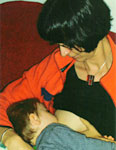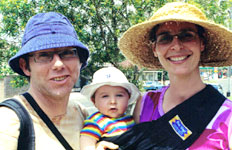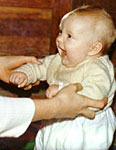MARGARET'S
STORY
My children were born in 1976
and 1979, so I had to discover for myself what you are
calling attachment parenting. That's as good a name as
any. It put them fortuitously between the decline of Dr
Spock and the rise of Robin Barker, so apart from a
booklet from the Baby Health Centre which I mostly
ignored, I was on my own. Literally, on an isolated farm
with no close neighbours, family many miles away, and a
husband with even less parenting experience than I had.
And to cap it off, we had no phone, just a dodgy radio
link to my brother-in-law 60 km away.
When I first became pregnant I
was doing a university course that included anthropology
and animal behaviour. My anthropology study included a
look at the Kung tribe of Kalahari bushmen, and I was
impressed with their low incidence of aggression, their
laid-back lifestyle, and their peaceful, cheerful way of
interacting.
My animal behaviour studies taught me that maternal
behaviour is innate in all mammals, and I couldn't see why
humans would be any different if we could ignore learned
behaviour. At every stage of parenting of my babies, I
thought, "What would a Kung woman do? What would she
have time for? Where would her baby be right now in
relation to the rest of the family?". (Not shut up in
a room on their own, that was for sure.)
I reasoned that the longest
period of human development took place in a family/tribal
environment not much different from how the Kung live, and
so that is the environment that is "natural" to
a baby. I tried to listen to my impulses and ignore
learned expectations. I guess it's odd that I used an
intellectual path to reach an instinctive response.
So my babies' upbringing included
extended feeding on demand (until the age of two in the
case of my son; my daughter lost interest sooner), being
carried in a sling first on my front, then when they were
older on my back, sleeping within arm's reach of our bed,
and general inclusion in whatever was going on. It worked
very well in fitting in with my work on the farm - I
simply picked them up, threw in a spare nappy, and took
them wherever I was going. If they got hungry, I sat down
against a tractor tyre or fencepost and fed them; if they
fell asleep, I settled them on a bunny rug on the ground
beside me with the dog nearby to keep snakes away.
It wasn't hard - in fact, it
would have been much harder for me to follow someone
else's rules. It was a joyful, playful, learning time that
laid a good foundation for our family. Of course there
were worries, especially about what to do if they were
sick, but that was a separate issue. I can't remember any
real dilemmas about how to react to their needs. When I
visited my mother when my first baby was a few months old,
my aunt commented with wonder that he never cried. My
mother replied, rather tartly I thought, "Of course
not, he doesn't have anything to complain about". |







